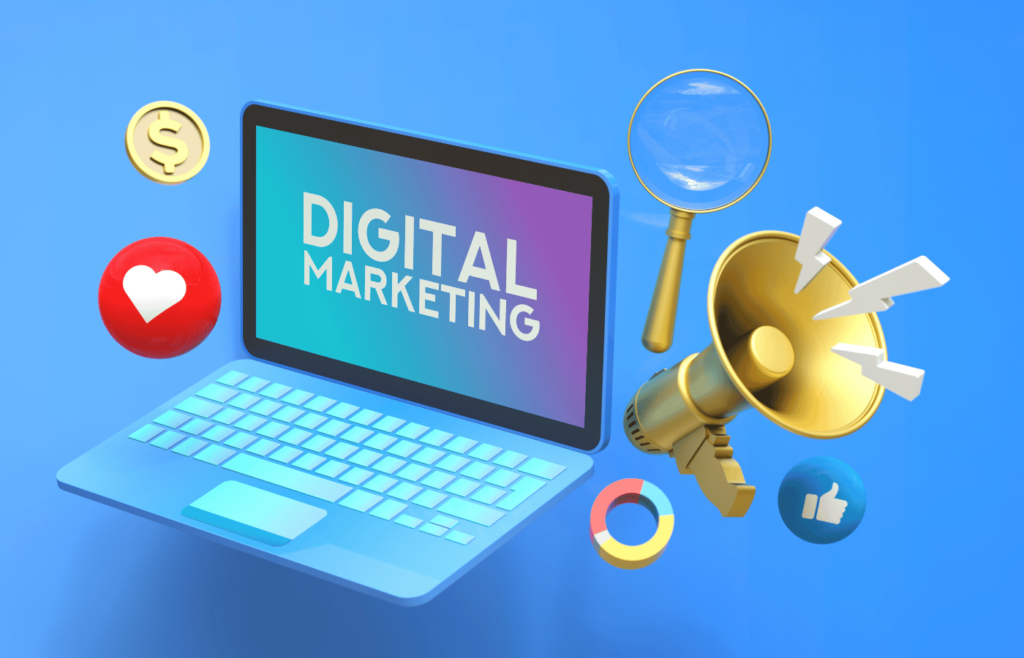Marketing is often seen as an optional expense for businesses, especially during a recession. However, the truth is that it is a must-have for businesses to survive and thrive during challenging economic times.
In this blog post, we outlined the reasons why marketing is essential during a recession and how it can help your business stay competitive and profitable.
1. Maintaining Brand Visibility

Cutting back on your marketing efforts can lead to a decline in brand visibility. This can make it harder for businesses to attract new customers and maintain relationships with existing ones. However, by continuing to invest in marketing, businesses can ensure that their brand remains visible and top of mind with customers. This can include strategies such as:
Email marketing campaigns
Social media advertising
Search engine optimization (SEO)
During the pandemic, many businesses turned to social media to maintain brand visibility and connect with customers. For instance, many restaurants used social media to promote their takeout and delivery options and communicate their safety measures.
2. Capturing Market Share

During a recession, many businesses may be forced to close their doors or reduce their offerings. This can create an opportunity for other businesses to capture market share and gain a competitive advantage. By continuing to invest in marketing, businesses can position themselves to take advantage of these opportunities and gain market share. This may involve strategies such as:
Offering promotions and discounts
Launching new products or services
Investing in research and development
Targeting new customer segments
During the last recession, the online retailer Amazon invested heavily in research and development, which helped them to launch new products and services that positioned them for long-term success.
3. Differentiating from Competitors

Businesses may be forced to reduce their prices, which can create a “race to the bottom” where businesses compete solely on price. However, by investing in marketing, businesses can differentiate themselves from competitors and position themselves as the best option for customers. This may involve strategies such as:
Developing a unique value proposition
Investing in branding and design
Building a strong online presence
Creating high-quality content
Offering personalized experiences
Apple continued to invest heavily in their product design and branding during the last recession, which helped them to differentiate themselves from their competitors and maintain strong sales.
4. Building Customer Loyalty

Customers may be more cautious with their spending and may seek out brands that they perceive as reliable and trustworthy. By investing in marketing, businesses can build trust and loyalty with their customers, which can help ensure long-term success. This may involve strategies such as:
Focusing on customer service and support
Offering personalized experiences
Providing valuable content and resources
Creating a loyalty program
Focus on providing valuable resources and support to your customers. For instance, during the height of the pandemic, many software companies offered free trials or extended their refund policies to help customers.
5. Leveraging Digital Marketing

During a recession, many businesses may be forced to cut back on their physical locations or reduce their hours of operation. However, digital marketing can provide a way to expand your reach and connect with customers online. This can include strategies such as:
Investing in a strong website that is optimized for search engines
Building a strong social media presence
Creating valuable content that can be shared online
Running targeted advertising campaigns
Leveraging email marketing and automation
Using data and analytics to measure and optimize performance
At the height of the pandemic, many businesses turned to online channels to reach their customers. For instance, fitness studios and gyms pivoted to offering online classes and training sessions to stay connected with their customers.
6. Adapting to Changing Customer Needs

Customer needs and preferences may shift as they adjust to changing economic circumstances. By investing in marketing, businesses can stay attuned to these changes and adapt their offerings to meet the evolving needs of their customers. This may involve strategies such as:
Conducting market research to understand customer needs and preferences
Launching new products or services that address these needs
Adjusting pricing and promotional strategies to appeal to cost-conscious customers
Creating messaging that resonates with customers during challenging times
Businesses pivoted to offering delivery or curbside pickup during the pandemic. These options were able to meet the needs of customers who were wary of shopping in person.
7. Building Brand Awareness

Consumers may be cutting back on spending or delaying purchases because of a recession. However, businesses can still benefit from investing in marketing by building brand awareness.
By keeping their brand top-of-mind with consumers, businesses can increase the likelihood that they will be considered when the economy improves or when customers are ready to make a purchase. This may involve strategies such as:
Running targeted advertising campaigns to reach potential customers
Creating engaging content that helps to build brand recognition and recall
Partnering with other businesses or influencers to expand reach and visibility
Leveraging social media to build a community of followers and advocates
Providing exceptional customer service to create positive word-of-mouth and referrals
Despite the economic uncertainty and challenges posed by the pandemic, Amazon increased its advertising spending by 50%!
They launched several campaigns throughout the pandemic to increase their brand awareness and showcase their services, including the “Delivering Smiles” campaign which showcased how Amazon was helping small businesses during the pandemic, and the “Support Small” campaign which encouraged customers to buy from small businesses on Amazon.
8. Identifying New Opportunities

While a recession can be a challenging time for businesses, it can also present new opportunities for growth and innovation. By investing in marketing, businesses can identify these opportunities and position themselves to capitalize on them. This may involve strategies such as:
Conducting market research to identify emerging trends and areas of growth
Exploring new distribution channels or partnerships to expand reach and sales
Developing new products or services that address unmet customer needs
Differentiating from competitors by offering unique value propositions or experiences
At the height of the pandemic, many businesses pivoted to offering virtual events and experiences as a way to engage with customers and drive revenue. These included everything from virtual concerts and cooking classes to online shopping events and virtual wine tastings.
9. Protecting Market Share

Businesses may face increased competition as more companies vie for a smaller pool of customers. By investing in marketing, businesses can protect their market share and fend off competitors. This may involve strategies such as:
Standing out from your competitors by offering unique value propositions or experiences can help you to differentiate yourself and attract more customers.
By focusing on building stronger relationships with your customers and keeping them loyal to your brand, you can reduce customer churn and maintain your market share over time.
You can use data and analytics to identify areas where you may need to improve and optimize your performance to stay ahead of the competition.
By investing in customer service and support, you can create positive experiences for your customers and set yourself apart from your competitors who may not prioritize the same level of care and attention.
Amid the COVID-19 outbreak, many grocery stores opted to prioritize delivery or curbside pickup options as a means of setting themselves apart from their rivals and retaining their market share. By offering customers an easy and hassle-free online shopping experience, these stores were able to foster customer loyalty and outperform competitors who were slower to respond to the changing needs of the market.
10. Maintaining Customer Loyalty

During an economic downturn, customers may become more price-conscious and inclined to switch to a rival if they discover a better bargain. To retain customer loyalty, businesses must concentrate on delivering outstanding customer service and creating a positive customer journey. This may involve strategies such as:
Offering personalized recommendations and deals based on customer information and preferences
Providing incentives and loyalty programs to reward frequent patronage
Promptly addressing customer inquiries and grievances
Ensuring transparent and comprehensible pricing and policies to establish trust and assurance
Providing value-added services or experiences that distinguish from competitors
Many businesses during the COVID-19 pandemic offered contactless payment and delivery options to deliver a safer and more convenient experience for customers. This helped them stand out from slower-to-adapt competitors and gave customers a compelling reason to remain loyal.
11. Maximizing ROI

During a recession, businesses may need to be more strategic about their spending and focus on activities that provide the greatest return on investment (ROI). By investing in marketing, businesses can maximize their ROI and make the most of their limited resources. This may involve strategies such as:
Concentrating on marketing strategies with a proven record of success
Allocating resources toward data and analytics to measure and optimize performance
Experimenting with and refining marketing campaigns to identify optimal approaches
Focusing on high-value customers and prospects to generate maximum revenue
Negotiating with suppliers and vendors to secure favorable deals.
An excellent illustration of this occurred during the last recession when companies invested in targeted advertising campaigns for high-margin products. By emphasizing these profitable items and concentrating on directed marketing campaigns, corporations were able to maintain their market share and emerge from the recession even stronger than before.
12. Building Long-term Relationships

While a recession may be a challenging time for businesses, it can also provide an opportunity to build long-term relationships with customers and stakeholders. By investing in marketing, businesses can demonstrate their commitment to their customers and build trust and loyalty over time. This may involve strategies such as:
Aligning CSR activities with the brand’s values to demonstrate commitment to social responsibility.
Demonstrating expertise and building credibility through thought leadership content.
Building customer relationships through engagement on social media and other digital channels.
Providing exceptional customer service that exceeds expectations.
Fostering trust and loyalty through a culture of transparency and honesty.
For instance, amid the COVID-19 pandemic, numerous businesses exhibited their dedication to their customers and communities by donating supplies, offering complimentary resources and services, and implementing safety measures to safeguard their employees and customers. These measures aided in fostering goodwill and enhancing relationships with customers and stakeholders.
In conclusion, marketing is still a critical tool to grow businesses even during a recession. By investing in marketing strategies that build brand visibility, improve market share, strengthen customer loyalty, and show brand adaptability, businesses can position themselves for long-term success.
We, at Boost Media Group, can help you navigate these challenging times and help you emerge stronger. Our team of marketing experts understands what it takes to take your business to the next level.
Book Your FREE Marketing Assessment Today!
Frequently Asked Questions
Why is marketing important during a recession?
Marketing helps businesses stay visible, attract new customers, and remain competitive even when times are tough.
How can businesses stay visible during a recession?
Businesses can stay visible by using email marketing, social media, content creation, and online ads to keep their brand in front of customers.
How can businesses grab market share during a recession?
By offering discounts, launching new products, targeting different customer groups, and investing in research and development.
How can businesses keep customers loyal during a recession?
Businesses can keep customers loyal by providing great service, offering personalized experiences, and creating loyalty programs.
Why is digital marketing important during a recession?
Digital marketing helps businesses reach more customers online, even if they reduce their physical stores or hours. This includes having a good website, creating useful content, and running online ads.





